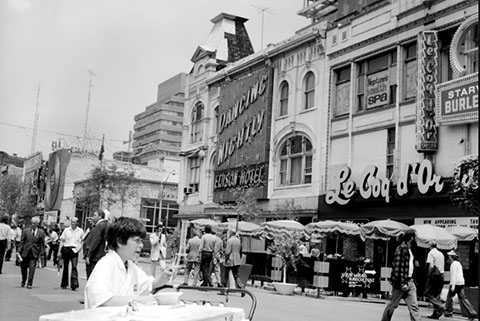Cet article provient de notre série « Toronto Feature ». Les articles provenant des séries précédentes ne sont pas mis à jour.
Ce contenu fait partie d'une série créée en collaboration avec les services au musée de la Ville de Toronto et Heritage Toronto. Nous remercions le ministère du Tourisme, de la Culture et du Sport de l'Ontario et le ministère du Patrimoine canadien pour leur financement.
« Cinema 2000, dans les eaux troubles de la rue Yonge »
Le 2 mars 1970, des policiers de la brigade des mœurs attendent patiemment dans le hall du Cinema 2000 que le film Vixen se termine. Ils saisissent ensuite quatre copies vidéo du film. Au milieu des années 1970, la rue Yonge, en particulier entre les rues Gerrard et Dundas, est déjà devenue la version torontoise de la 42e rue de New York, un quartier prisé des entreprises dites « pour adultes ». Le Cinema 2000 est alors au centre de l’action.
Lorsqu’il ouvre en octobre 1969, le Cinema 2000 exploite une lacune dans la réglementation de la censure en ne montrant que des films sur cassette vidéo. Ce support n’est en effet pas soumis aux coups de ciseau de la Commission de censure de l’Ontario.
Le cinéma a cependant été accusé d’outrage aux bonnes mœurs pour avoir montré les films dans un but commercial. Malgré trois procès séparés et 40 000 dollars de frais de justice, le tribunal prononce un verdict en faveur du Cinema 2000, qui devient ainsi le premier cinéma au Canada à gagner un procès relatif à la censure de scènes montrant des activités sexuelles.
Le meurtre du jeune cireur de chaussures Emanuel Jaques dans un salon de massage de la rue Yonge en 1977 et la publication d’un rapport municipal recommandant plusieurs stratégies pour faire face au nombre croissant d’entreprises louches se traduisent néanmoins par une réglementation plus sévère. Le Cinema 2000 ferme finalement ses portes le 10 octobre 1982, après les projections successives de Hot Cats et de On a Waterbed. Même la bannière « Yonge Street is Fun Street » (on s’amuse sur la rue Yonge) placée au-dessus de la salle de jeux vidéo Funland finira par disparaître.

 Partager sur Facebook
Partager sur Facebook Partager sur X
Partager sur X Partager par Email
Partager par Email Partager sur Google Classroom
Partager sur Google Classroom




